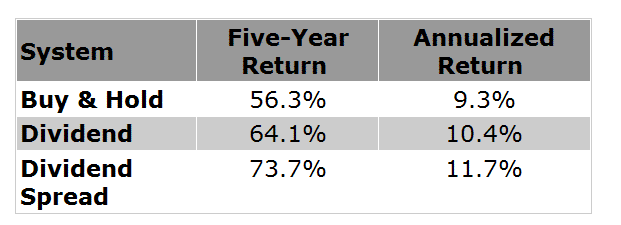Why NOW Is a Great Time to Buy Dividend Stocks
Companies / Dividends Mar 26, 2013 - 06:12 PM GMTBy: DailyWealth
Steve Sjuggerud writes: Every long-term investor knows dividends matter.
Since 1900, the average annual gain on the S&P 500 has been 5%. But by simply reinvesting your dividends, you nearly double that number to 9.4%.
But what's the most valuable way to put dividends to work? Most folks will say you should buy stocks when dividend yields are relatively high. And that's true...
But there's another number you should be watching.
As I said, dividends make a big difference in your long-term stock returns. And the difference adds up...
Without dividends, $10,000 invested in 1900 would have turned into more than $2.5 million today. But by simply reinvesting your dividends, the same $10,000 turns into more than $263 million. That's a 10,420% increase, simply by reinvesting dividends.
Now, you might think that buying when the dividend yield on stocks is high would be a winning strategy. And while this beats the long-term average return on stocks, we put our True Wealth Systems computers to work to see if we could do better.
Our results might surprise you...
To test the idea, we looked at "relative" dividend yields, meaning the current dividend yield versus the dividend yield of the last three years. If today's yield is the highest of the last three years, yields are at a "relative" extreme, and we should buy.
This idea works. Since 1900, the average five-year return on stocks, with dividend reinvestment, is 56.3%. But buying and holding (and reinvesting) for five years when dividends are at a "relative" extreme increases our returns to 64.1%.
That's a big improvement. But our computers found an even better way to use dividends...
You see, we also need to understand how dividend yields compare with other investments – specifically, basic government bonds.
For example, a 5% dividend yield would be amazing today, with our ultra-low interest rates. But in 1982, when 10-year Treasurys were 14%, a 5% dividend yield wasn't a great deal.
So to determine relative value, we looked at the "spread" between S&P 500 dividend yields and 10-year Treasurys, using the three-year "relative" extreme to tell us when to buy. The results are below...

As you can see, buying based on the dividend spread not only increases our returns over buy-and-hold... but it also beats buying simply based on dividends.
The results are simple... dividends matter. But the spread between dividends and U.S. Treasurys matters even more. Buying when the spread is high is an easy way to increase your stock returns over the long term.
Today, our system says it's time to buy. Last month's spread reading was at a "relative" extreme.
Based on history, buying today should lead to above-average returns over the next five years.
Good investing,
Steve Sjuggerud and Brett Eversole
The DailyWealth Investment Philosophy: In a nutshell, my investment philosophy is this: Buy things of extraordinary value at a time when nobody else wants them. Then sell when people are willing to pay any price. You see, at DailyWealth, we believe most investors take way too much risk. Our mission is to show you how to avoid risky investments, and how to avoid what the average investor is doing. I believe that you can make a lot of money – and do it safely – by simply doing the opposite of what is most popular.
Customer Service: 1-888-261-2693 – Copyright 2013 Stansberry & Associates Investment Research. All Rights Reserved. Protected by copyright laws of the United States and international treaties. This e-letter may only be used pursuant to the subscription agreement and any reproduction, copying, or redistribution (electronic or otherwise, including on the world wide web), in whole or in part, is strictly prohibited without the express written permission of Stansberry & Associates Investment Research, LLC. 1217 Saint Paul Street, Baltimore MD 21202
Disclaimer: The above is a matter of opinion provided for general information purposes only and is not intended as investment advice. Information and analysis above are derived from sources and utilising methods believed to be reliable, but we cannot accept responsibility for any losses you may incur as a result of this analysis. Individuals should consult with their personal financial advisors.
Daily Wealth Archive
|
© 2005-2022 http://www.MarketOracle.co.uk - The Market Oracle is a FREE Daily Financial Markets Analysis & Forecasting online publication.



